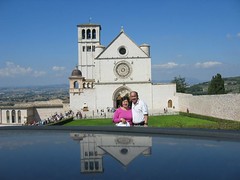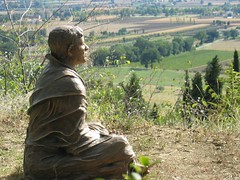'I know that the Lord will maintain the cause of the afflicted and will execute justice for the needy.' Psalms 140:12
In the heyday of mass evangelism in the 1960s and 1970s, there were many evangelistic 'crusades' with an overdrive of direct and confrontational delivery of the gospel message. Pleased with the results, Christians ignored other forms of witnessing such as social concerns and social actions. Christians began to put lifestyle witnessing and doing good works to the back burner. These were considered as less effective in securing God's redemption for unbelievers.
Such thinking went against the grain of Christian witness and the teachings of Jesus. Jesus said that at the second coming there will be a separation of the sheep from the goats among Christ's followers. He said that the sheep will receive an inheritance in contrast to the goats. The sheep receive merit because they ministered in ways Jesus explained so dramatically:
'Lord, when did we see you hungry and feed you, or thirsty and give you something to drink? When did we see you a stranger and invite you in or needing clothes and clothe you? When did we see you sick in prison and go to visit you? The King will reply 'Truly I tell you, whatever you did for the least of these brothers and sisters of mine, you did for me.' Matthew 25:38-40
Since its beginning, Christianity challenged its members to stand up for the rights of the poor and perform acts of charity. In Acts 6, seven deacons were appointed to look after widows and to see to the distribution of food.
An early church father, St John Chrysostom preached that in order to call oneself a Christian, one must be mindful of one’s neighbor, care for him and his needs. Chrysostom even expected the poor to share what little they had; much like the poor widow who gave her two mites:
"You say that you are yourself too poor to help others. If that is what is worrying you, listen to me when I tell you that poverty is not a bar to almsgiving, for were you a thousand times poorer than you are you would still not be poorer than the woman who had only a handful of flour or that other who had only a couple of pennies. These, by giving all that they had to the poor, showed that great poverty is not incompatible with great generosity."
As the early Christians faced issues of poverty, so will Christians today. The poor may need a helping hand to get out of a fatalistic future. Mother Teresa said, “All my years of service to the poor have helped me to understand that they (the poor) are precisely the ones who better understand human dignity. If they have a problem, it is not lack of money, but the fact that their right to be treated humanly and with tenderness is not recognised."
Christians are called upon to change the very structures that took advantage of the poor or kept them in poverty. In Oct 1981, the Methodist Church in Singapore set up the Methodist Welfare Services. Today the MWS runs 4 nursing homes, 7 senior activity or elder care centres, 5 family services centres, 1 girls' residence and 1 student care centre. Its areas of impact include:
- Care of the chronically ill, frail and destitute
- Empowering of families in distress
- Engaging the socially isolated
- Rehabilitating at risk youth
- Advancing disadvantaged children
We realise that Christ places a dignity on the downtrodden and the disenfranchised, those who are the least among us. Chrysostom encouraged Christians to live their faith by loving their neighbor, “If you have love, you will not notice the loss of your money, the labor of your body, the toil of your words, your trouble or your ministering, but you will bear everything courageously.”
The works of the various Christian charity organisations like the MWS are indeed truly commendable. Governments rely on private organisations to provide the service and funds for charitable works. Many governments provide tax deductions to encourage giving and also provide some support to these organisations. But sometimes, the support comes with a catch; there should not be a spiritual overtone to the charitable service.
Over time, these restrictions unwittingly caused an insidious secularisation within these church based charitable organisations. Notably, organisations and staff misunderstand that there is an imposition against propagating the faith in executing the charitable service. Actually the advice is not against propagating religion but to be careful and sensitive about doing it. Kind service borne out of love for Christ and neighbours will cause others to inquire about the faith within us. Opportunities to share the gospel abound. This is unavoidable, work and witness cannot be separated.
Yet, unfortunately, work and witness start to drift apart. The very success of Christian charitable organisations blocks their ability to witness and share the gospel. This is indeed sad and gradually the love for work supplants the love for Christ in these services. We forget that our spiritual service emanates from the love of and for Christ. In the book of Revelations, the church at Ephesus exemplified this dichotomy,
'I know your deeds, your hard work and your perseverance. Yet I hold this against you; You have forsaken the love you had at first.' Rev 2:2,4
The church must avoid this pitfall. We must find a good balance between evangelism, witnessing and social concerns while staying sensitive to the multi-religious societies we live in. In every instance, we are called to love our neighbours not just with words but also with deeds, with acts of charity, kindness, social action and social justice. The love for one another and the love for neighbours distinguishes us as Christ's disciples and drives our Christian service. In turn our Christian service becomes our Christian witness.
I love you with the love of the Lord
Yes I love you with the love of the Lord
I can see in you the glory of my King and
I love you with the love of the Lord
Lionel
Updated 1st Published 25 Apr 2021






